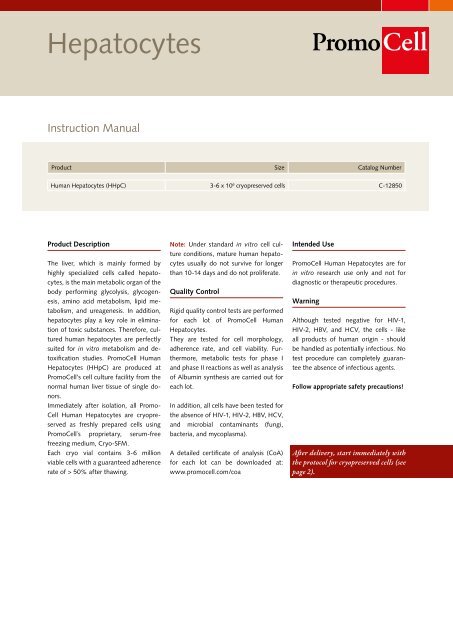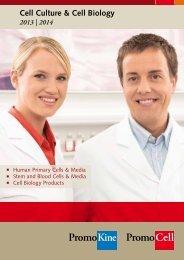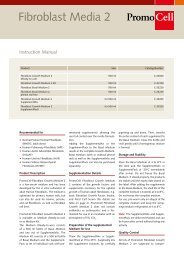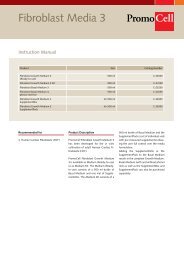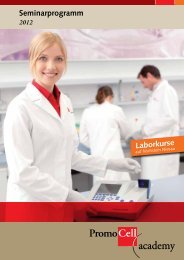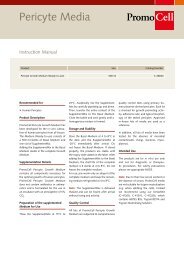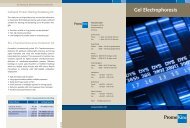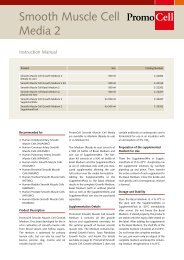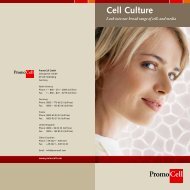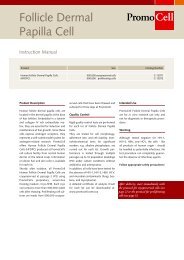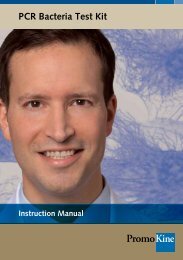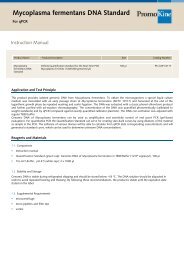Hepatocytes - PromoCell
Hepatocytes - PromoCell
Hepatocytes - PromoCell
You also want an ePaper? Increase the reach of your titles
YUMPU automatically turns print PDFs into web optimized ePapers that Google loves.
<strong>Hepatocytes</strong><br />
Instruction Manual<br />
Product Size Catalog Number<br />
Human <strong>Hepatocytes</strong> (HHpC) 3-6 x 10 6 cryopreserved cells C-12850<br />
Product Description<br />
The liver, which is mainly formed by<br />
highly specialized cells called hepatocytes,<br />
is the main metabolic organ of the<br />
body performing glycolysis, glycogenesis,<br />
amino acid metabolism, lipid metabolism,<br />
and ureagenesis. In addition,<br />
hepatocytes play a key role in elimination<br />
of toxic substances. Therefore, cultured<br />
human hepatocytes are perfectly<br />
suited for in vitro metabolism and detoxification<br />
studies. <strong>PromoCell</strong> Human<br />
<strong>Hepatocytes</strong> (HHpC) are produced at<br />
<strong>PromoCell</strong>’s cell culture facility from the<br />
normal human liver tissue of single donors.<br />
Immediately after isolation, all Promo-<br />
Cell Human <strong>Hepatocytes</strong> are cryopreserved<br />
as freshly prepared cells using<br />
<strong>PromoCell</strong>´s proprietary, serum-free<br />
freezing medium, Cryo-SFM.<br />
Each cryo vial contains 3-6 million<br />
viable cells with a guaranteed adherence<br />
rate of > 50% after thawing.<br />
Note: Under standard in vitro cell culture<br />
conditions, mature human hepatocytes<br />
usually do not survive for longer<br />
than 10-14 days and do not proliferate.<br />
Quality Control<br />
Rigid quality control tests are performed<br />
for each lot of <strong>PromoCell</strong> Human<br />
<strong>Hepatocytes</strong>.<br />
They are tested for cell morphology,<br />
adherence rate, and cell viability. Furthermore,<br />
metabolic tests for phase I<br />
and phase II reactions as well as analysis<br />
of Albumin synthesis are carried out for<br />
each lot.<br />
In addition, all cells have been tested for<br />
the absence of HIV-1, HIV-2, HBV, HCV,<br />
and microbial contaminants (fungi,<br />
bacteria, and mycoplasma).<br />
A detailed certificate of analysis (CoA)<br />
for each lot can be downloaded at:<br />
www.promocell.com/coa<br />
Intended Use<br />
<strong>PromoCell</strong> Human <strong>Hepatocytes</strong> are for<br />
in vitro research use only and not for<br />
diagnostic or therapeutic procedures.<br />
Warning<br />
Although tested negative for HIV-1,<br />
HIV-2, HBV, and HCV, the cells - like<br />
all products of human origin - should<br />
be handled as potentially infectious. No<br />
test procedure can completely guarantee<br />
the absence of infectious agents.<br />
Follow appropriate safety precautions!<br />
After delivery, start immediately with<br />
the protocol for cryopreserved cells (see<br />
page 2).
2 Instruction Manual - <strong>Hepatocytes</strong><br />
Start immediately after delivery.<br />
Use aseptic techniques and a laminar flow bench.<br />
Protocol for Cryopreserved Human <strong>Hepatocytes</strong> (HHpC)<br />
Straight after arrival, store the cryopreserved cells in liquid nitrogen, or seed them immediately.<br />
Note: Storage at -80°C is not sufficient for cell preservation and causes irreversible cell damage.<br />
Note: For culturing <strong>Hepatocytes</strong>, Collagen type I coated culture vessels are necessary. Please make sure to have them before<br />
starting the protocol.<br />
1. Prepare the medium<br />
Prewarm <strong>PromoCell</strong> Hepatocyte<br />
Growth Medium at 37°C (5 ml<br />
Growth Medium for 1 ml cell solution<br />
in the cryo vial).<br />
2. Thaw the cells<br />
Remove the cryovial from the liquid<br />
nitrogen container and immediately<br />
place it on dry ice - even for short<br />
transportation. Under a laminar flow<br />
bench, briefly twist the cap a quarter<br />
turn to relieve pressure, then retighten.<br />
Immerse the vial into a water<br />
bath (37°C) just up to the screw cap<br />
for 2 minutes. Ensure that no water<br />
enters the thread of the screw cap.<br />
3. Disinfect the vial and transfer the<br />
cells<br />
Thoroughly rinse the cryovial with<br />
70% ethanol under a laminar flow<br />
bench. Then, aspirate the excess<br />
ethanol from the thread area of the<br />
screw cap. Open the vial and carefully<br />
transfer the cells to the tube with<br />
the prewarmed medium from step 1.<br />
Avoid pipetting the suspension up<br />
and down in the cryovial.
Instruction Manual - <strong>Hepatocytes</strong><br />
3<br />
Start immediately after delivery.<br />
Use aseptic techniques and a laminar flow bench.<br />
4. Seed and incubate the cells<br />
Agitate the tube carefully and determine<br />
the number of viable cells. Dilute<br />
the cells to the desired concentration.<br />
The recommended seeding<br />
density for HHpC on type I Collagen<br />
coated culture vessels is 150.000 cells<br />
per cm². Place the vessel in an incubator<br />
(37°C, 5% CO2) for 4 hours.<br />
5. Replace the medium<br />
Viable cells should be attached after<br />
4 hours.<br />
Note: Non-attached cells may cause<br />
medium turbidity and should not be<br />
mistaken for a contamination.<br />
For removal of the non-attached<br />
cells aspirate the medium from the<br />
vessel. Add new Hepatocyte Growth<br />
Medium.<br />
6. Check and incubate the cells<br />
Check the cell density and place the<br />
vessel in an incubator (37°C, 5%<br />
CO 2<br />
).
Specifications<br />
Product<br />
Recommended<br />
Culture Media*<br />
Plating Density Passage after Thawing Marker<br />
Human <strong>Hepatocytes</strong> (HHpC) C-25010<br />
C-25020<br />
150,000<br />
cells per cm²<br />
P0 Phase I reaction +<br />
Phase II reaction +<br />
Albumin +<br />
Related Products<br />
Product Size Catalog Number<br />
Hepatocyte Growth Medium<br />
500 ml C-25010<br />
(Ready-to-use)<br />
Hepatocyte Growth Medium Kit 500 ml C-25110<br />
Hepatocyte Basal Medium 500 ml C-25210<br />
Hepatocyte Basal Medium,<br />
500 ml C-25215<br />
phenol red-free<br />
Hepatocyte Growth Medium<br />
for 500 ml C-39642<br />
SupplementMix<br />
Hepatocyte Growth Medium<br />
for 500 ml C-39640<br />
SupplementPack<br />
Hepatocyte Maintenance Medium<br />
500 ml C-25020<br />
(Ready-to-use)<br />
Hepatocyte Maintenance Medium Kit 500 ml C-25120<br />
Hepatocyte Maintenance Medium<br />
for 500 ml C-39652<br />
SupplementMix<br />
Hepatocyte Maintenance Medium<br />
for 500 ml C-39650<br />
SupplementPack<br />
HHpC Pellet 1 million cells per pellet C-14085<br />
PromoFectin-Hepatocyte<br />
0.1 ml<br />
0.5 ml<br />
PK-CT-2000-HEP-10<br />
PK-CT-2000-HEP-50<br />
*The catalog numbers in this table are for media in ready-to-use packaging.<br />
<strong>PromoCell</strong> GmbH<br />
Sickingenstr. 63/65<br />
69126 Heidelberg<br />
Germany<br />
Email: info@promocell.com<br />
www.promocell.com<br />
USA/Canada<br />
Phone: 1 – 866 – 251 – 2860 (toll free)<br />
Fax: 1 – 866 – 827 – 9219 (toll free)<br />
Deutschland<br />
Telefon: 0800 – 776 66 23 (gebührenfrei)<br />
Fax: 0800 – 100 83 06 (gebührenfrei)<br />
France<br />
Téléphone: 0800 90 93 32 (ligne verte)<br />
Téléfax: 0800 90 27 36 (ligne verte)<br />
United Kingdom<br />
Phone: 0800 – 96 03 33 (toll free)<br />
Fax: 0800 – 169 85 54 (toll free)<br />
Other Countries<br />
Phone: +49 6221 – 649 34 0<br />
Fax: +49 6221 – 649 34 40<br />
12/2012


